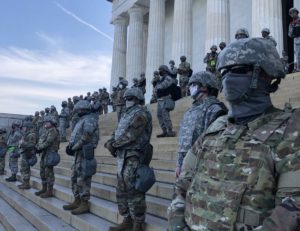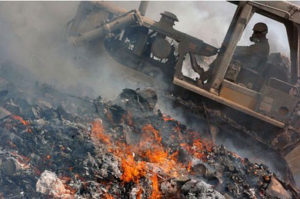Podcast: Play in new window | Download
Code Pink: U.S. Military’s Unwarranted Influence
In 1961, President Eisenhower warned America of the “unwarranted influence of the military-industrial complex. Later in the ‘60’s Senator J. William Fulbright spoke of what he named the “military-industrial-academic complex.” And he was both prescient and wise to do so, for today colleges and universities in America receive nearly 200 Billion dollars annually from the Department of Defense to do research and development for the military. And this money plays an oversized role in how our colleges and universities are funded today.
Indeed, as you will hear in a few moments from today’s guest on this topic, the influence of this DoD money on what is researched and taught at America’s colleges and university is profound. And it contributes greatly to our pro-war politics while denying money and research for addressing problems like climate change, and curing new diseases, or finding new ways to fight poverty, or better educate our children. And with this year’s Pentagon budget topping $768 billion, this should concern all who seek a more peaceful world and a world where economic and social justice prevail.
Currently, 2,500 of the main institutions of higher learning in America receive this DoD’s blood money for military related research. And often little is known by way of just what is being researched and developed for the military on our campuses; of knowing what new ways to kill people are on the drawing board. For example, I must confess that in preparing for today’s show I learned, to my utter disgust, that the University of Michigan, my undergraduate alma matter, ranks 2 or 3 among the American universities receiving money from the Department of Defense.
Guest – Marcy Winograd is the Coordinator of CODE PINK CONGRESS, Co-Chair of the Progressive Democrats of America’s End Wars and Occupations Team, and herself a former candidate for Congress. She is an expert on the military-industrial-academic complex, as well as a long-time activist for peace and social justice.
—-
The U.S. Military And Climate Change
Although the U.S. military has called climate change an “existential” threat to national security, its actions belie its words. The U.S. military is the largest institutional source of greenhouse gases in the world. But due to a loophole in the 2015 Paris climate agreement and the Kyoto Protocol, it is not required to disclose the extent of its pollution. Moreover, the 2021 budget calls for the Pentagon to report on the U.S. greenhouse gas emissions for the past 10 years. But the Pentagon missed its July deadline.
In 2020, the U.S. military emitted 51 million tons of carbon dioxide, primarily from fuel and the maintenance of over a half million buildings, according to the Cost of War Project at Brown University. Significantly, the U.S. wars in Iraq and Afghanistan emitted 1.2 billion tons of greenhouse gases between 2001 and 2017. Those wars cost U.S. taxpayers $8 trillion and killed 900,000 people.
But the U.S. government’s commitment to reduce emissions falls short of the goals of the Paris agreement. The U.S. efforts were rated “insufficient” by the Climate Action Tracker. If other countries follow suit, the temperature would rise by 2 to 3 degrees Celsius, which would prove disastrous.
In November, more than 100,000 people participated in demonstrations at the United Nations Climate Change Convention (COP 26) in Glasgow, Scotland. Upwards of 500 delegates to the convention had ties to the fossil fuel industry. The watered-down statement that came out of COP 26 called for a “phase-down of unabated coal power and inefficient fossil fuel subsidies” rather than the “phase-out of fossil fuels.”
Dr. Jim Rine is an adjunct professor of geology at Wayne State University, who for decades has published his research on marine geology, environmental geology, and the potential interactions of the U.S. petroleum industry to climate change. In 2019, he helped form the Veterans for Peace Climate Crisis and Militarism National Project. The project helped draft H. Res. 767, which Rep. Barbara Lee (California) introduced in the House of Representatives in November.
Veterans For Peace Climate Crisis Take Action
H. Res. 767, which has 31 co-sponsors, calls on the Defense Department to report on its emissions, to set “clear” annual emissions reductions targets, and to pledge to conduct “strict, transparent, and independently verified reporting” on emissions. The resolution also incorporates the House version of the 2022 National Defense Authorization Act that says, “DoD should lower its emissions to prevent exceeding an increase in global temperature by 1.5 degrees Celsius.”
—————————-




